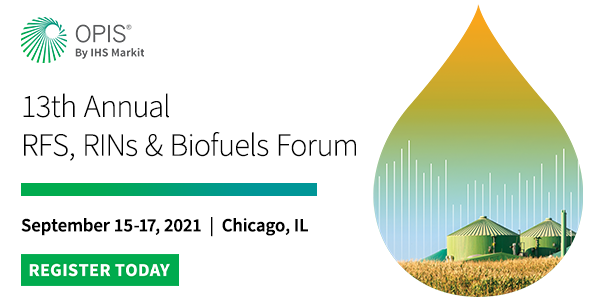RFS, RINs and Biofuels Forum Preview
Each year, attendees of OPIS’s RFS, RINs & Biofuels Forum come to the event looking for answers about biofuel markets and the government’s approach to the Renewable Fuel Standard (RFS) program.
With a new administration in the White House, record-high Renewable Identification Number (RIN) credits and a government and public increasingly focused on carbon emission reduction, there are more questions than usual in advance of this year’s conference, scheduled for September 15-17 in Chicago.
Forum attendees can participate in discussions regarding:
- RIN price outlook
- Impact of the Supreme Court’s ruling on small refinery waivers
- Biofuel demand and COVID-19
- Biofuels and renewable diesel vs. electric vehicles in the Biden Administration
- Renewable diesel feedstock concerns
- Growth of sustainable aviation fuels
- Future of the RFS
Speakers at the forum will discuss the following questions:
- Where are RIN prices headed?
Ethanol-related D6 RINs hit $2 in the late spring and remained just under that level for most of the summer, giving refiners and fuel importers fresh arguments that the costs of compliance require Congress to either repeal the program or make significant changes. Will RIN prices hold near record levels or will policy action from the Environmental Protection Agency (EPA) lead to a drop in credit values? - How will EPA proceed in the aftermath of the Supreme Court’s ruling on small refinery waivers?
It’s widely believed the Biden Administration will take a more restrictive approach to granting small refinery exemptions than the Trump Administration. However, it’s unclear how the EPA will deal with the backlog of small refinery exemption (SRE) waiver petitions and address new petitions in wake of the Supreme Court’s ruling that held obligated parties did not need to maintain an unbroken string of waivers to be eligible for new exemptions. - What are the key legal challenges now facing the program?
In recent years, the direction of the RFS has hinged heavily on battles won and lost in the courtroom. Our legal experts will discuss how the latest court rulings could affect the RFS program and the twists and turns may lie ahead. - How has the pandemic impacted biofuel demand and how have producers fared?
At times, margins have been negative for biofuels producers since the COVID-19 pandemic began. How have they coped with the new environment and is there reason for optimism? - How has the Biden Administration impacted the RFS so far and what should we expect next?
The Biden Administration has voiced support for biofuels, but some renewable fuel producers worry that the president’s drive to increase the use of electric vehicles could leave them with a shrinking market. Will the Biden Administration lay out a clear role for biofuels or will electric vehicles take a higher priority? - How will the growth of renewable diesel impact biodiesel and the RFS
California has been ahead of the rest of the U.S. in demonstrating how the strong growth in renewable diesel production can affect biodiesel. Our speakers will discuss biodiesel’s role in a market where renewable diesel output is likely to expand rapidly. - Could the stars align for a replacement to the RFS?
The biofuels and petroleum industries have rarely seen eye to eye on the RFS, but key players from both sides have urged Congress to establish a nationwide Low Carbon Fuel Standard (LCFS). How likely is that to happen and would it come as an add-on to the RFS or in place of the RFS? - How will achieving RFS compliance be affected by RVO delays and other changes to the program?
Lengthy delays and policy uncertainty are certainly not new elements of the RFS program. Hear from experts on how to best navigate the turbulence and ensure there are no unexpected snags or surprises in achieving RFS compliance and satisfying all obligations. - Will feedstock availability hinder the planned renewable diesel capacity buildout?
The U.S. Energy Information Administration recently estimated that renewable diesel capacity could rise to 5.1 billion gal/year by 2024 from 600 million gal/year in 2020. But there are significant concerns that competition for low-carbon intensity (CI) feedstocks will likely prevent some of those projects from proceeding. What’s the real potential of the renewable diesel capacity buildout? - What kind of policy support is needed for sustainable aviation fuel to become a readily available option?
Airlines around the world are committing to growing the blending of sustainable aviation fuel (SAF). Some European governments have imposed or are considering imposing minimum blending mandates. But current global production, while growing, falls far short of what’s needed to meet demand from the airline industry. Where is the industry now and what kind of policy and market support is needed to spur necessary growth in the SAF capacity?
Now in its 13th year, the OPIS RFS, RINs & Biofuels Forum is the premier conference for up-to-date information on the biofuels market and the RFS program. Register early for the conference and ensure you don’t miss the regulatory and marketplace discussions that attendees have come to rely on at this event, plus essential in-person networking.

